This vegan Rasta Pasta Recipe is a delightful and colorful dish with the bold, spicy, and herb-infused flavors of Jamaica. A delicious one-pot pasta meal with a creamy sauce that only takes 20 minutes to be on the table, ideal for busy weeknights. Enjoy the perfect recipe combination of plant-based chicken, red and green peppers, and aromatic spices.

What is Rasta Pasta?
Rasta Pasta is a flavorful and colorful dish that draws its inspiration from the Rastafarian culture of Jamaica. This unique culinary creation is characterized by its bold and vibrant appearance, mirroring the spirited lifestyle and beliefs of the Rastafarian movement.
What truly sets Rasta Pasta apart is its fusion of spicy, herb-infused flavors, making it a favorite among those who appreciate a bit of heat and a burst of exotic tastes in their meals.
At the heart of Rasta Pasta is a medley of fresh, vibrant vegetables, often including bell peppers, tomatoes, and scallions, which contribute to its captivating rainbow of colors. These veggies are sautéed to perfection and combined with aromatic spices in Jerk seasoning like thyme, allspice, and scotch bonnet peppers, creating a harmonious blend of tastes that dance on your taste buds. Rasta Pasta is typically served with a rich, creamy sauce, usually made vegan-friendly by using coconut milk or dairy-free alternatives.
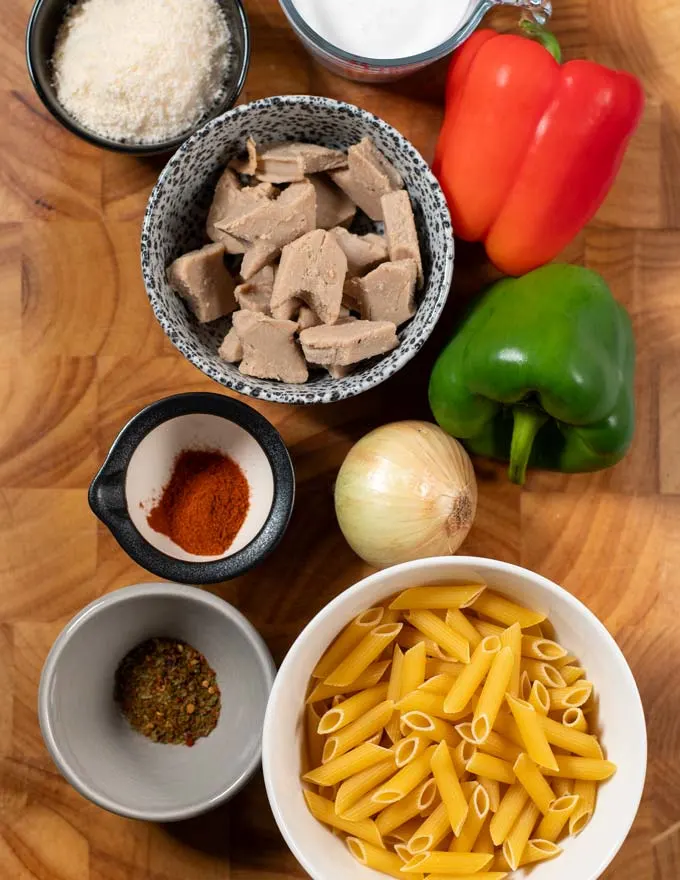
What is jerk seasoning?
Jerk seasoning is a spice blend and marinade from Jamaica, used to season meat before grilling or smoking. It has a bold and spicy flavor profile that combines sweet, savory, and spicy elements. The primary ingredients include allspice, Scotch bonnet peppers, thyme, scallions, garlic, ginger, nutmeg, cinnamon, cloves, salt, and black pepper.
Allspice is a crucial ingredient that provides the distinctive flavor of jerk seasoning. Scotch bonnet peppers add heat, while thyme provides an earthy and herbal flavor. Scallions offer a mild onion flavor, and garlic adds depth and robustness. Ginger adds spiciness and citrusy zest, and nutmeg, cinnamon, and cloves offer sweetness and warmth.
Salt and black pepper balance the flavors and enhance the overall taste. Jerk seasoning is primarily used to season and marinate chicken and pork, and it is known for its bold and spicy flavor profile. Whether you’re grilling or smoking, jerk seasoning is a great way to add some heat and bold flavors to your meat.
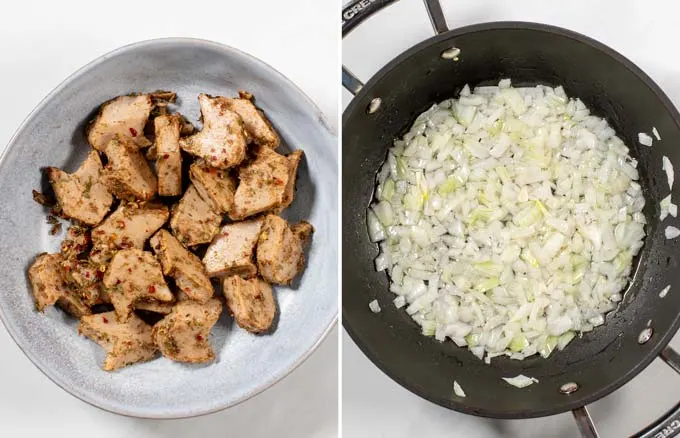
What is Jamaican jerk seasoning used for
Jamaican jerk seasoning is a versatile spice blend originating from Jamaica known for its bold and spicy taste, which can be used in various ways to add a Caribbean twist to your dishes.
It can be used as a marinade, grilling coat, or roasting spice for a wide range of proteins and vegetables. You can also incorporate it into stir-fries, rice and grains, sauces and dips, soups and stews, baked goods, tofu or tempeh, dips and condiments, basting sauce, and sauces for seafood dishes.
Remember that the spiciness level of jerk seasoning can vary from brand to brand, so you may want to adjust the amount you use to suit your taste. With its unique flavor, Jamaican jerk seasoning is a fantastic way to infuse your dishes with a taste of the Caribbean and a bit of heat.
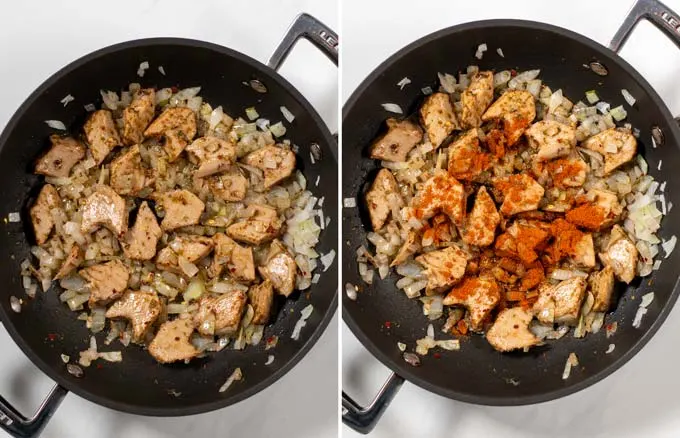
What ingredients do I need for this Vegan Rasta Pasta Recipe
Vegan Rasta Pasta is a delicious and flavorful dish that requires a few key ingredients. First and foremost, you’ll need penne pasta, which is the perfect shape for holding onto all the other ingredients. Next, you’ll need some olive oil, both for the marinade and for frying the vegan chicken.
The magic of Rasta Pasta comes from the unique blend of spices used in the marinade. Jerk seasoning is a must-have for this recipe, as it adds a powerful punch of flavor. Paprika also adds a smoky and slightly sweet taste to the dish. Fresh garlic cloves, onion, and red and green peppers provide a vibrant pop of color and an extra layer of flavor.
To make the dish creamy and rich, full-fat coconut milk is added to the mix – no heavy cream is needed. And finally, to top it all off, vegan parmesan cheese is added for a cheesy flavor. With these ingredients, you can create a mouth-watering vegan Rasta Pasta Recipe that’s sure to impress.
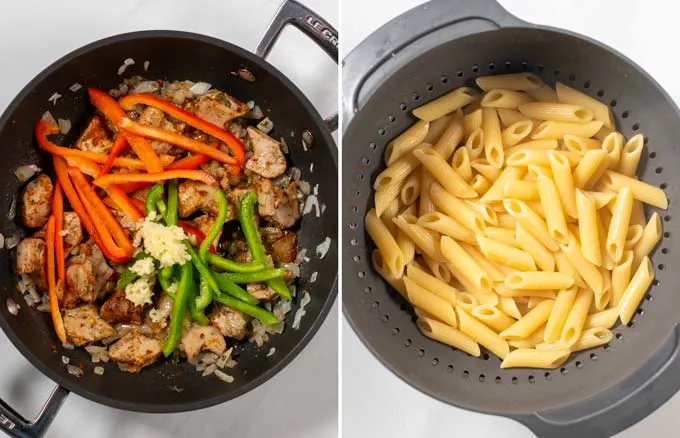
What are alternatives for coconut milk?
Coconut milk is a popular ingredient globally, known for its creamy texture and tropical taste. It’s used in various dishes, from curries to desserts. However, for people with allergies or lactose intolerance, finding a suitable alternative can be a challenge. Fortunately, the culinary world offers a range of options catering to different dietary needs.
Some of the popular coconut milk alternatives include almond milk, oat milk, rice milk, soy milk, cashew milk, hemp milk, macadamia milk, and flax milk. Almond milk, for example, is a dairy and soy-free option with a subtle nutty flavor used as a 1:1 replacement for coconut milk in most recipes. Oat milk, on the other hand, is renowned for its creamy consistency and natural sweetness, making it perfect for dairy-free ice creams, creamy soups, and rich lattes.
Soy milk is a versatile dairy-free option with a mild flavor and natural thickness, making it ideal for thickening soups, curries, and creamy pasta dishes. Cashew milk has a creamy texture and a mild, slightly nutty taste that complements both savory and sweet dishes. Hemp milk is known for its earthy flavor and high nutritional content, while macadamia milk has a rich buttery flavor, making it a great addition to coffee, desserts, or sauces. Flax milk is a nutritious and versatile option used in baking, smoothies, and as a dairy-free addition to morning cereal.
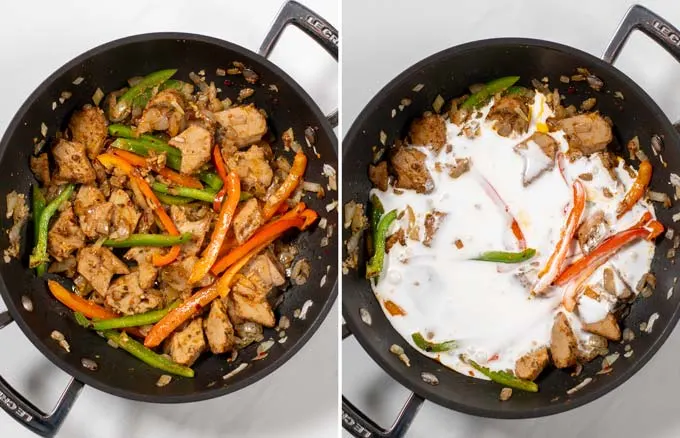
How to make Vegan Rasta Pasta
To make this vegan version of Rasta Pasta, start by marinating the plant-based chicken. If it is not already cut into small pieces, do so and add them to a bowl. Add 1 tablespoon of Jerk seasoning and 1 tablespoon of oil to the bowl. Mix everything together until the chicken is well coated with the seasoning and oil. Let the chicken marinate for at least 15 minutes to allow it to absorb the flavors.
While the chicken is marinating, cook the pasta. Bring a large pot of salted water to a boil. Add the penne pasta to the boiling water and cook pasta al dente according to the package instructions. Drain the pasta and set it aside. Of course, you can also use leftover pasta, if you have some.
Now, it’s time to make the sauce. Place a pan on medium heat and add 1 tablespoon of oil to it. Once the oil is hot, add chopped onions to the pan and sauté them for about 1 minute until they are translucent. Add minced garlic and marinated chicken to the pan and cook for around 4 more minutes. Add chopped bell peppers, paprika seasoning, a pinch of salt, and pepper to the pan and cook for 2 more minutes. Pour in canned coconut milk and the cooked pasta into the pan and stir everything together. Cook everything for 2 more minutes until the sauce thickens slightly.
Finally, it’s time to serve. Divide the pasta and chicken mixture among plates or bowls. Garnish with chopped fresh herbs or grated cheese, if desired. Serve warm.
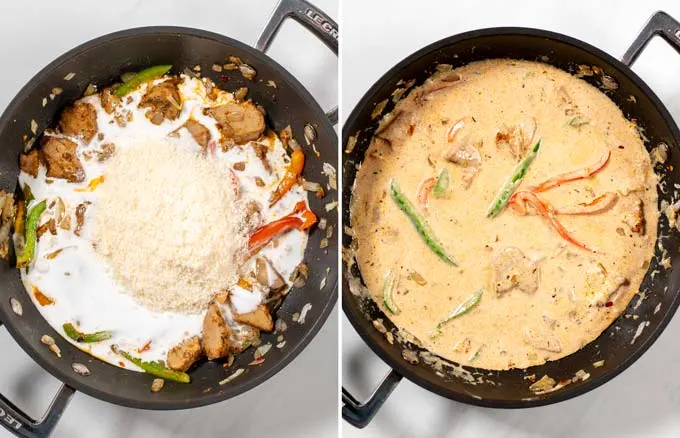
What to do with leftovers of vegan Rasta Pasta
Leftovers of vegetarian Rasta Pasta recipe can be repurposed into delicious new meals or simply reheated for a quick and flavorful meal.
The simplest option is to reheat the leftovers and enjoy them just as they are. Store them in an airtight container in the fridge after the pasta has cooled down to room temperature. You can heat them in the microwave or on the stovetop. If the pasta has dried out a bit, you can add a splash of vegetable broth, coconut milk, or water to revive the creaminess.
You could also turn your leftovers into a cold pasta salad by adding some fresh vegetables, such as bell peppers, cherry tomatoes, and cucumbers. Or use the leftover Rasta Pasta as a filling for wraps or burritos. Spoon it into tortillas along with some fresh greens, avocado, and maybe a vegan protein source like tofu or tempeh.
Another idea is to use the vegan Rasta Pasta as a stuffing for bell peppers or tomatoes. Hollow out the vegetables, fill them with the pasta, top with vegan cheese, and bake until the vegetables are tender.
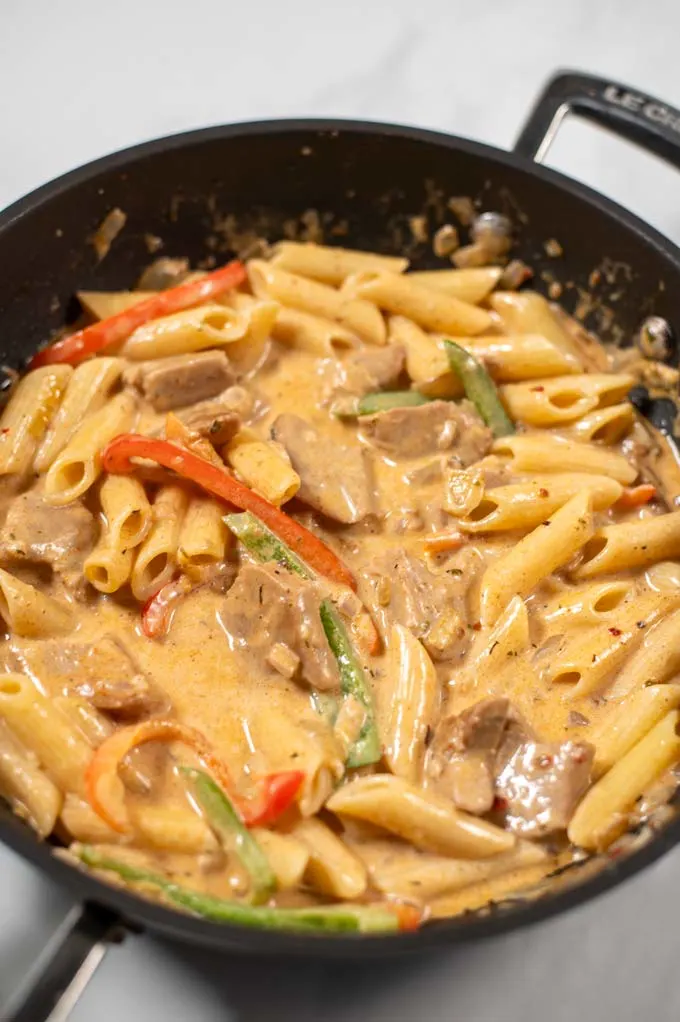
More amazing Pasta Recipes to try
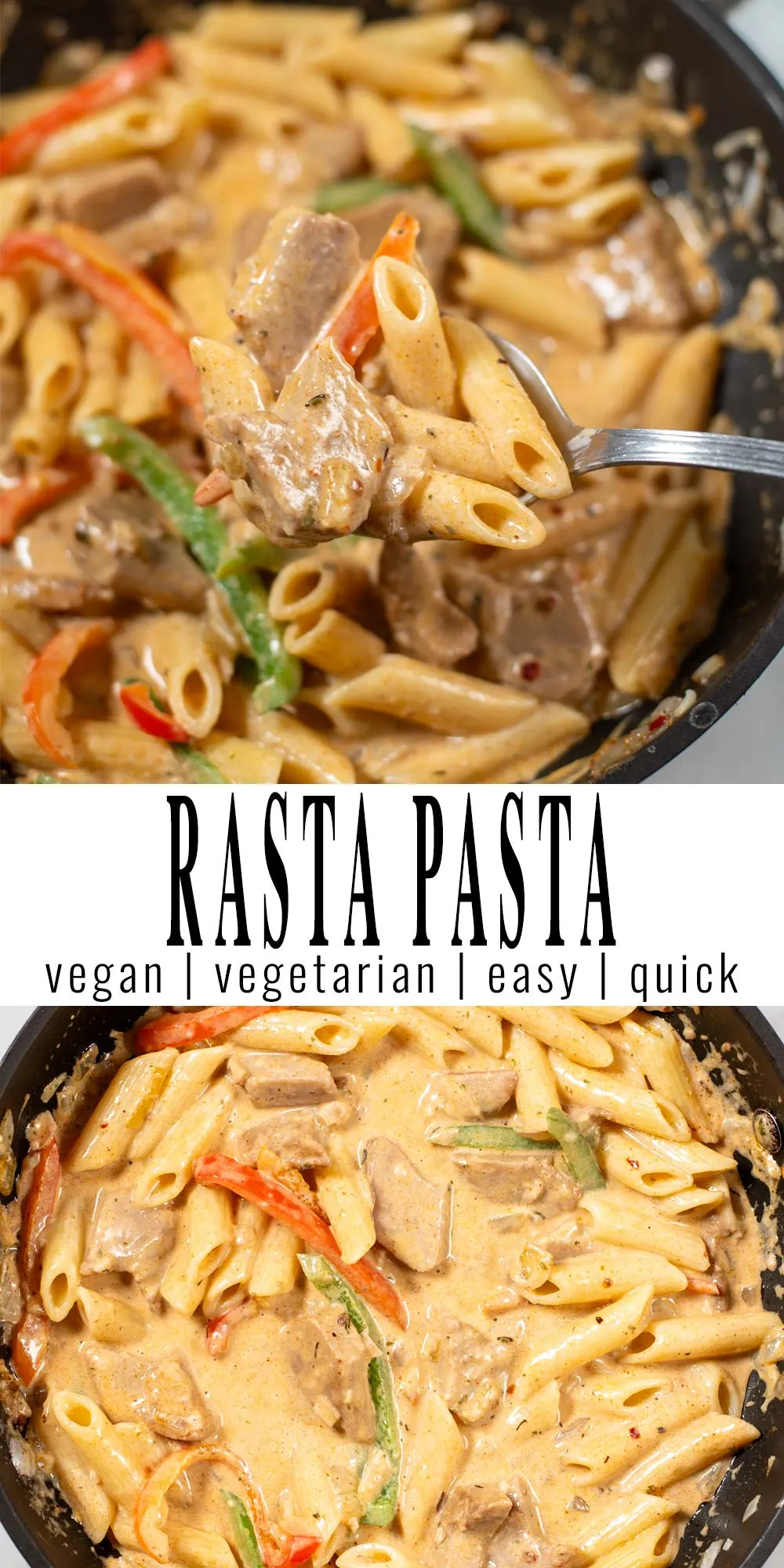
Share your comments and pictures of your remakes of this easy Vegan Rasta Pasta Recipe with a tag on Instagram or Facebook.
Enjoy, Florian
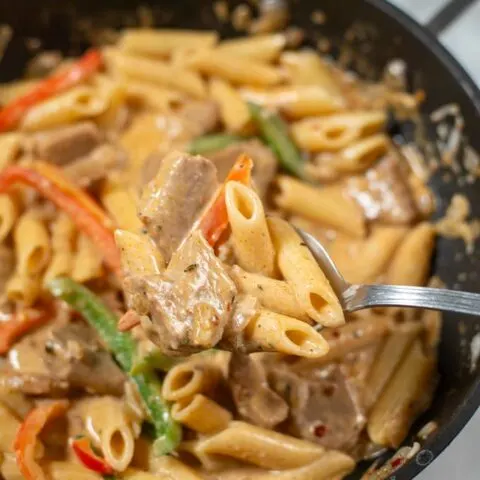
Easy Vegan Rasta Pasta
This vegan Rasta Pasta Recipe is a delightful and colorful dish with the bold, spicy, and herb-infused flavors of Jamaica. A delicious one-pot pasta meal with a creamy sauce that only takes 20 minutes to be on the table, ideal for busy weeknights. Enjoy the perfect recipe combination of plant-based chicken, red and green peppers, and aromatic spices.
Ingredients
- 8 oz penne pasta
- 6 oz vegan chicken
- 1/2 green bell pepper, sliced
- 1/2 red bell pepper, sliced
- 3 garlic cloves, minced
- 1 medium onion, diced
- 2 tbsp olive oil, divided
- 2 tbsp Jerk seasoning
- 1 tsp Paprika
- 3/4 cup Coconut milk
- 1/3 cup vegan parmesan
- Salt, black pepper to taste
Instructions
- Start by marinating the plant-based chicken. If it is not already cut into small pieces, do so and add them to a bowl. Add 1 tablespoon of Jerk seasoning and 1 tablespoon of oil to the bowl. Mix everything together until the chicken is well coated with the seasoning and oil. Let the chicken marinate for at least 15 minutes to allow it to absorb the flavors.

- While the chicken is marinating, cook the pasta. Bring a large pot of salted water to a boil. Add the penne pasta to the boiling water and cook pasta al dente according to the package instructions. Drain the pasta and set it aside. Of course, you can also use leftover pasta, if you have some.
- Now, it's time to make the sauce. Place a pan on medium heat and add 1 tablespoon of oil to it. Once the oil is hot, add chopped onions to the pan and sauté them for about 1 minute until they are translucent.
- Add minced garlic and marinated chicken to the pan and cook for around 4 more minutes. Add chopped bell peppers, paprika seasoning, a pinch of salt, and pepper to the pan and cook for 2 more minutes.

- Pour in canned coconut milk and the cooked pasta into the pan and stir everything together. Cook everything for 2 more minutes until the sauce thickens slightly.

- Finally, it's time to serve. Divide the pasta and chicken mixture among plates or bowls. Garnish with chopped fresh herbs or grated cheese, if desired. Serve warm.
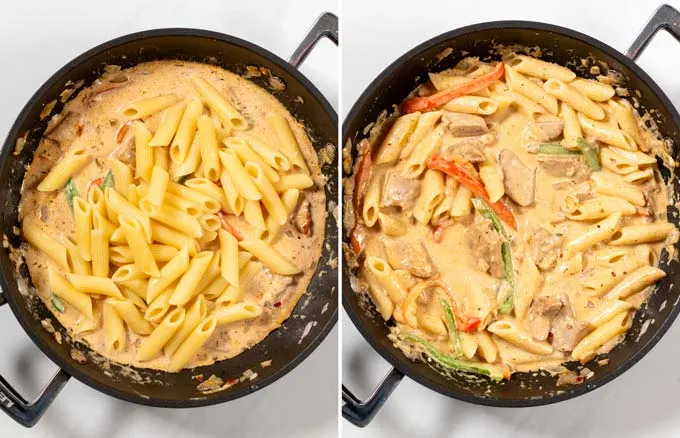
Notes
- Store leftovers in an airtight container in the fridge after the pasta has cooled down to room temperature.
- You can heat vegan Rasta Pasta in the microwave or on the stovetop.
- If the pasta has dried out a bit, you can add a splash of vegetable broth, coconut milk, or water to revive the creaminess.
Nutrition Information:
Yield: 4 Serving Size: 1.5 cupsAmount Per Serving: Calories: 395Total Fat: 12gSaturated Fat: 5gTrans Fat: 0gUnsaturated Fat: 5gCholesterol: 0mgSodium: 432mgCarbohydrates: 27gFiber: 2gSugar: 4gProtein: 18g